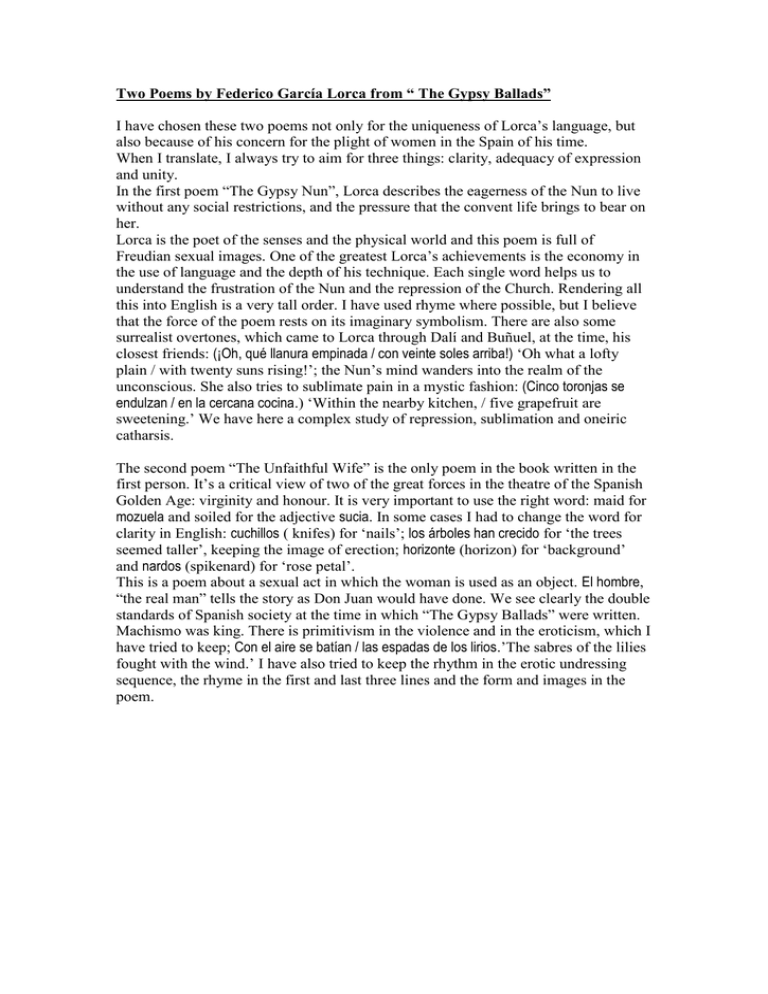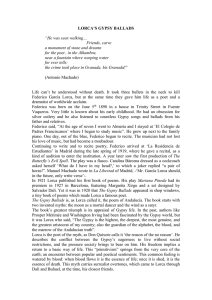
Two Poems by Federico García Lorca from “ The Gypsy Ballads”
I have chosen these two poems not only for the uniqueness of Lorca’s language, but
also because of his concern for the plight of women in the Spain of his time.
When I translate, I always try to aim for three things: clarity, adequacy of expression
and unity.
In the first poem “The Gypsy Nun”, Lorca describes the eagerness of the Nun to live
without any social restrictions, and the pressure that the convent life brings to bear on
her.
Lorca is the poet of the senses and the physical world and this poem is full of
Freudian sexual images. One of the greatest Lorca’s achievements is the economy in
the use of language and the depth of his technique. Each single word helps us to
understand the frustration of the Nun and the repression of the Church. Rendering all
this into English is a very tall order. I have used rhyme where possible, but I believe
that the force of the poem rests on its imaginary symbolism. There are also some
surrealist overtones, which came to Lorca through Dalí and Buñuel, at the time, his
closest friends: (¡Oh, qué llanura empinada / con veinte soles arriba!) ‘Oh what a lofty
plain / with twenty suns rising!’; the Nun’s mind wanders into the realm of the
unconscious. She also tries to sublimate pain in a mystic fashion: (Cinco toronjas se
endulzan / en la cercana cocina.) ‘Within the nearby kitchen, / five grapefruit are
sweetening.’ We have here a complex study of repression, sublimation and oneiric
catharsis.
The second poem “The Unfaithful Wife” is the only poem in the book written in the
first person. It’s a critical view of two of the great forces in the theatre of the Spanish
Golden Age: virginity and honour. It is very important to use the right word: maid for
mozuela and soiled for the adjective sucia. In some cases I had to change the word for
clarity in English: cuchillos ( knifes) for ‘nails’; los árboles han crecido for ‘the trees
seemed taller’, keeping the image of erection; horizonte (horizon) for ‘background’
and nardos (spikenard) for ‘rose petal’.
This is a poem about a sexual act in which the woman is used as an object. El hombre,
“the real man” tells the story as Don Juan would have done. We see clearly the double
standards of Spanish society at the time in which “The Gypsy Ballads” were written.
Machismo was king. There is primitivism in the violence and in the eroticism, which I
have tried to keep; Con el aire se batían / las espadas de los lirios.’The sabres of the lilies
fought with the wind.’ I have also tried to keep the rhythm in the erotic undressing
sequence, the rhyme in the first and last three lines and the form and images in the
poem.








